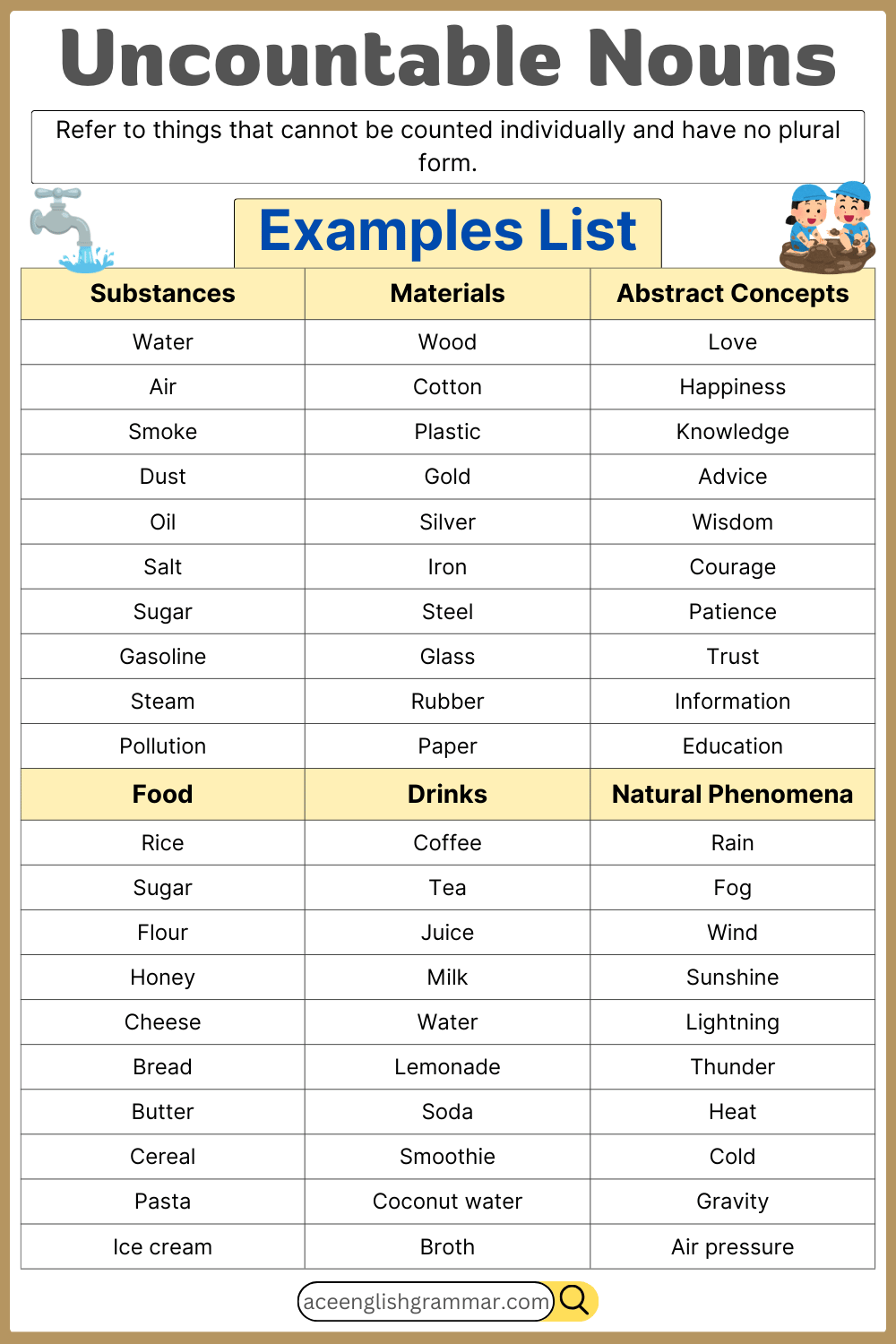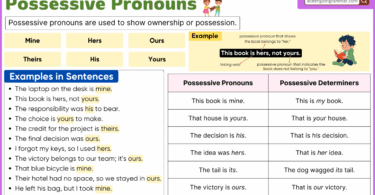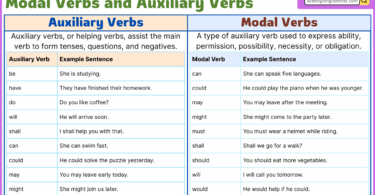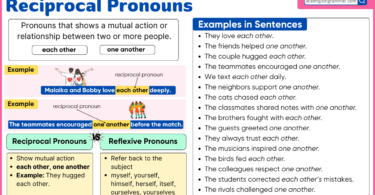Mastering uncountable nouns is crucial for improving English fluency. These nouns refer to things that cannot be counted individually and exist as a mass, concept, or substance. Unlike countable nouns, they do not have plural forms and require singular verbs. Learning the correct usage of uncountable nouns enhances both writing accuracy and speaking clarity. Whether discussing abstract ideas, substances, or categories, understanding how to use them correctly prevents common grammar mistakes and ensures effective communication.
Table of Contents
What Are Uncountable Nouns?
Uncountable nouns are nouns that cannot be counted individually because they refer to things that are seen as a whole or in a mass. These nouns do not have a plural form and are used with singular verbs. They include substances, abstract concepts, and some collective categories.
- Substances: water, oil, rice, milk
- Abstract Concepts: happiness, courage, information, advice
- Collective Categories: furniture, luggage, equipment, traffic
Rules of Uncountable Nouns
1. Uncountable Nouns Do Not Have a Plural Form
Unlike countable nouns, uncountable nouns do not have a plural version.
- ✅ The air is fresh in the morning.
- ❌ The airs are fresh in the morning.
- ✅ She gave me some important advice.
- ❌ She gave me two advices.
2. Uncountable Noun Use Singular Verbs
Since uncountable noun refer to a mass or abstract concept, they are always treated as singular and take a singular verb.
- ✅ Milk is good for health.
- ❌ Milk are good for health.
- ✅ The information was useful.
- ❌ The information were useful.
3. Use Quantifiers to Measure Uncountable Noun
Because you cannot count uncountable noun directly, use quantifiers to express an amount.
| Uncountable Noun | Correct Usage | Incorrect Usage |
|---|---|---|
| Water | A glass of water | Two waters ❌ |
| Rice | A bowl of rice | Three rices ❌ |
| Information | A piece of information | An information ❌ |
| Advice | Some advice | An advice ❌ |
4. Some Nouns Can Be Both Countable and Uncountable
Certain nouns can be both countable and uncountable depending on their meaning in context.
| Uncountable (General Meaning) | Countable (Specific Items) |
|---|---|
| I love chicken. (meat) | There’s a chicken in the yard. (animal) |
| I drink coffee every morning. (beverage) | I ordered two coffees. (cups of coffee) |
| She has experience in teaching. (general) | She had three amazing experiences. (specific events) |
5. Use ‘Some’ and ‘Any’ with Uncountable Noun
Instead of using numbers, use “some” (positive sentences) and “any” (negative & interrogative sentences).
- ✅ I have some flour for baking.
- ✅ Do you have any sugar?
- ✅ We don’t have any milk left.
A to Z List of Uncountable Nouns
To help you understand better, here is a table of uncountable nouns categorized alphabetically:
| List | Examples |
|---|---|
| A | Advice, Anger, Air |
| B | Beauty, Bread, Blood |
| C | Coffee, Courage, Cash |
| D | Dust, Data, Danger |
| E | Education, Equipment |
| F | Furniture, Freedom |
| G | Gold, Gratitude, Gas |
| H | Happiness, Honesty |
| I | Information, Ink |
| J | Joy, Juice |
| K | Knowledge, Kindness |
| L | Laughter, Luggage |
| M | Money, Music, Milk |
| N | News, Nutrition |
| O | Oxygen, Oil, Obedience |
| P | Patience, Progress |
| Q | Quality, Quantities |
| R | Rain, Respect, Rice |
| S | Sugar, Smoke, Safety |
| T | Tea, Traffic, Trust |
| U | Understanding, Usage |
| V | Violence, Vision |
| W | Water, Wisdom, Work |
| X | Xenophobia |
| Y | Youth |
| Z | Zeal |

Using Uncountable Nouns in Sentences
Uncountable nouns follow specific grammatical rules in sentences. They do not take plural forms and cannot be used with a/an. Instead, quantifiers like “some,” “a lot of,” and measurement words such as “a glass of,” “a piece of” are used to specify quantity.
✅ Fatima received useful information about the scholarship.
“Information” is uncountable, so we do not use “an” or “a” before it.
❌ Ahmed bought three breads from the bakery.
“Bread” is uncountable. We should say “three loaves of bread.”
✅ Aisha’s happiness was evident in her smile.
“Happiness” is an abstract uncountable noun, so it remains singular.
✅ There is some milk in the fridge.
(We use “some” instead of “a” or “an” because “milk” is uncountable.)
✅ She gave me a piece of advice.
(“Advice” is uncountable, so we say “a piece of advice” instead of “an advice.”)
✅ Omar has a lot of knowledge about Islamic history.
(“Knowledge” is uncountable and cannot take a plural form.)
Why Do We Need to Learn This?
Understanding uncountable nouns is essential because:
- It improves English fluency and accuracy in writing and speaking.
- It helps avoid common grammar mistakes, especially with quantifiers and articles.
- It enhances sentence structure and correctness, making communication clearer.
Common Mistakes to Avoid
Many learners make errors when using uncountable noun. Here are some common mistakes and corrections:
| Mistake | Correction |
| ❌ I need an advice. | ✅ I need some advice. |
| ❌ He gave me many informations. | ✅ He gave me a lot of information. |
| ❌ There are many traffics on the road. | ✅ There is a lot of traffic on the road. |
| ❌ She has a good knowledge about history. | ✅ She has good knowledge about history. |
Exercise on Uncountable Nouns
Fill in the blanks with the correct uncountable noun:
- We need some _______ to cook this dish. (oil/waters)
- Hassan gave me great _______ about my career. (advice/information)
- Too much _______ can be harmful to your health. (sugars/sugar)
- There is no _______ in this room. (furnitures/furniture)
- The teacher shared valuable _______ with the students. (knowledge/knowledges)
FAQs
Uncountable nouns refer to things that cannot be counted individually because they exist as a mass or concept. Examples include water, advice, happiness, furniture, and rice.
We can make them countable by using quantifiers or measurements, such as:
A piece of advice
Three loaves of bread
A glass of milk
A bit of information
No, uncountable nouns do not have a plural form. They always remain singular. For example, we say “knowledge is important” instead of “knowledges are important.”
Some common uncountable nouns include water, furniture, money, information, rice, music, oil, traffic, happiness, and sugar.
Download PDF
Do you need a printable version of this guide? Click the link below to download the PDF and keep it handy for easy reference! 👇
Conclusion
Uncountable noun play a crucial role in English grammar. They represent abstract concepts, substances, and mass items that cannot be counted individually. Understanding how to use them correctly enhances language fluency, grammatical accuracy, and effective communication. By following the rules and examples in this guide, learners can avoid common mistakes and improve their overall English proficiency.
Read More



